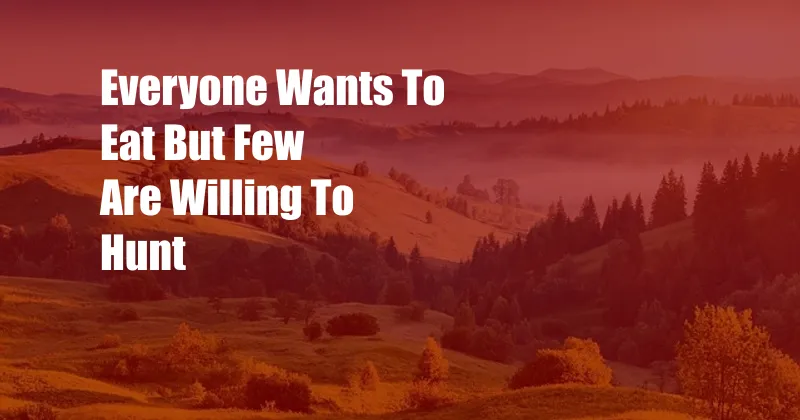
Everyone Wants to Eat, But Few Are Willing to Hunt
In the realm of human existence, the primal instinct of sustenance remains a fundamental Notwendigkeit. Yet, in a world of unparalleled convenience and abundance, the act of hunting, once a life-sustaining skill, has become an alien concept for many. Like the fabled unicorn, the true hunter has become a mythical creature, a vestige of a bygone era.
This societal shift has fostered a profound disconnect between humans and their food sources. We fill our plates with meticulously packaged sustenance, bereft of any visceral connection to the origin of our nourishment. We have traded the thrill of the chase for the comfort of supermarket aisles, unknowingly relinquishing a primal aspect of our humanity.
The Art of Hunting: A Testament to Human Ingenuity
Hunting is not merely a means of acquiring sustenance; it is a testament to human ingenuity and resilience. For millennia, humans have employed their intellect and adaptability to outwit prey, utilizing an arsenal of tools and strategies to secure their survival. From the invention of the bow and arrow to the development of complex tracking techniques, the art of hunting is a symphony of human ingenuity.
Beyond its practical significance, hunting has played a profound cultural and spiritual role in human societies. From the nomadic tribes of Central Asia to the indigenous peoples of the Americas, hunting has been inextricably linked to cultural identity, religious rituals, and storytelling traditions. It has fostered a deep respect for the interconnectedness of all living things, teaching humans the virtues of patience, perseverance, and gratitude for the bounty of nature.
The Lost Connection: Food as a Commodity, Not a Conquest
In modern society, our relationship with food has undergone a profound transformation. Food has become a commodity, a product to be purchased and consumed without much thought to its origins or its journey. This detachment has led to widespread apathy and ignorance regarding the sources of our sustenance.
The industrialization of food production has further exacerbated this disconnect. Factory farms and mass-market agriculture have replaced traditional methods of animal husbandry and crop cultivation. As a result, we have lost our ancestral connection to the land and the animals that nourish us. We have become mere consumers, oblivious to the hidden costs of our food choices, both for our health and for the planet.
Reconnecting with the Hunt: A Path to Mindfulness and Sustainability
Reconnecting with the art of hunting is not about reverting to a primitive lifestyle. Rather, it is about embracing a mindful approach to food consumption. By understanding the challenges and rewards of the hunt, we can develop a deeper appreciation for the value of sustenance, and we can make more informed choices about the food we eat.
Participating in hunting activities, such as archery, fishing, or game processing, can provide a unique opportunity to connect with nature and to witness the delicate balance of the ecosystem. It can foster a profound respect for the animals we harvest, and it can inspire us to live more sustainably, reducing our environmental footprint and supporting the conservation of wildlife.
Tips and Expert Advice for Aspiring Hunters
If you are intrigued by the idea of hunting but lack the necessary skills or experience, consider seeking guidance from experienced hunters or joining a local hunting club. These organizations offer invaluable resources for beginners, providing training, mentorship, and access to hunting grounds.
Remember, hunting is a skill that requires patience and dedication. Don’t be discouraged if you don’t experience immediate success. Embrace the learning process, enjoy the camaraderie of fellow hunters, and never lose sight of the ethical and responsible principles of the sport.
FAQ on Hunting
Q: Is hunting cruel to animals?
A: Hunting, when conducted ethically and responsibly, can be a humane way to manage wildlife populations and provide sustenance for humans. Hunters are required to follow strict regulations and ethical guidelines to ensure the well-being of animals and minimize their suffering.
Q: Is hunting necessary in modern society?
A: While modern agriculture provides an abundant supply of food, hunting remains an important source of sustenance for many communities around the world. Additionally, hunting plays a vital role in wildlife management, controlling overpopulation and maintaining a healthy ecosystem.
Q: How do I get started with hunting?
A: To get started with hunting, you will need to obtain a hunting license and complete a hunter education course. You can also seek guidance from experienced hunters or join a hunting club for support and mentorship.
Conclusion
In the tapestry of human experience, the act of hunting has played a transformative role, shaping our culture, our ingenuity, and our relationship with the natural world. While modern society has distanced us from our primal connection to food, the essence of the hunt continues to resonate within us. By embracing the art of hunting, we can reconnect with our heritage, gain a deeper appreciation for the value of sustenance, and cultivate a more mindful and sustainable approach to life.
Are you ready to embark on a journey of self-discovery and reconnect with the primal instinct that lies within us? The hunt awaits…